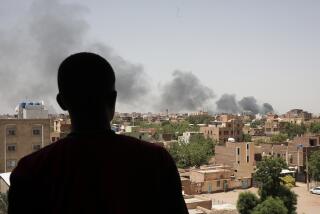Envoys unsuccessful in Kenya
- Share via
NAIROBI, KENYA — Efforts to resolve Kenya’s disputed presidential election faltered Thursday as diplomats from the United States and African Union left the country without forging an agreement.
As he departed, African Union Chairman John Kufuor, who is president of Ghana, said both sides had agreed to a new round of talks under the stewardship of former U.N. Secretary-General Kofi Annan.
Annan will lead a panel of African experts expected to convene soon in Kenya.
But the prospects appeared dim as Kenyan President Mwai Kibaki and his challenger, Raila Odinga, who have refused to meet, blamed each other for the collapse of talks supervised by the African Union.
“The failure of this mission is a big blow,” said Salim Lone, Odinga’s spokesman. “We are exhausted and very jaded. And now we are back to square one.”
The breakdown raises the specter of more rioting, which has left about 500 people dead and 250,000 displaced since the Dec. 27 presidential and parliamentary elections.
Odinga plans to meet today with his advisors to consider renewing his call for massive rallies in Nairobi to demonstrate his popular support. He previously had agreed to call off the protests in the capital while negotiations with Kibaki were underway.
Though Odinga has asked his supporters to refrain from violence, many Kenyans fear that mass demonstrations will increase the death toll as police and protesters clash.
Earlier Thursday, riot police in Nairobi used tear gas to break up a demonstration of about 70 women, who taunted the officers by shouting, “Shame on you.”
Kenya has been in turmoil since the balloting, which international observers say suffered from widespread irregularities. The country’s election commissioner declared Kibaki the winner, and he was hastily inaugurated Dec. 30. But the same official later acknowledged irregularities in the voting.
Under the African Union initiative, both sides had been working on a proposal drafted by the World Bank in which they would share power in a coalition government, according to Lone, Odinga’s spokesman. But he said Kibaki refused Thursday to sign the agreement.
In a statement, Kibaki accused Odinga of being unresponsive to his overtures. Kibaki this week offered to include Odinga in a unity government, though details were never made clear.
Jendayi Frazer, the U.S. State Department’s top Africa diplomat, arrived in Kenya this week to help resolve the dispute, but she left Thursday.
Kibaki’s administration has adopted an increasingly hard-line approach toward talks, moving quickly to solidify power by appointing ministers and a vice president. The president watched Thursday as 15 new Cabinet ministers were sworn in, brushing aside pleas from the international community that he delay such decisions until the dispute is resolved.
Now even some Odinga supporters say that his political options appear to be dwindling. Because his party won a slim majority of seats in the parliament, Odinga could attempt to exert his influence there. But the parliament historically has been weak and easily manipulated.
--
More to Read
Sign up for Essential California
The most important California stories and recommendations in your inbox every morning.
You may occasionally receive promotional content from the Los Angeles Times.













